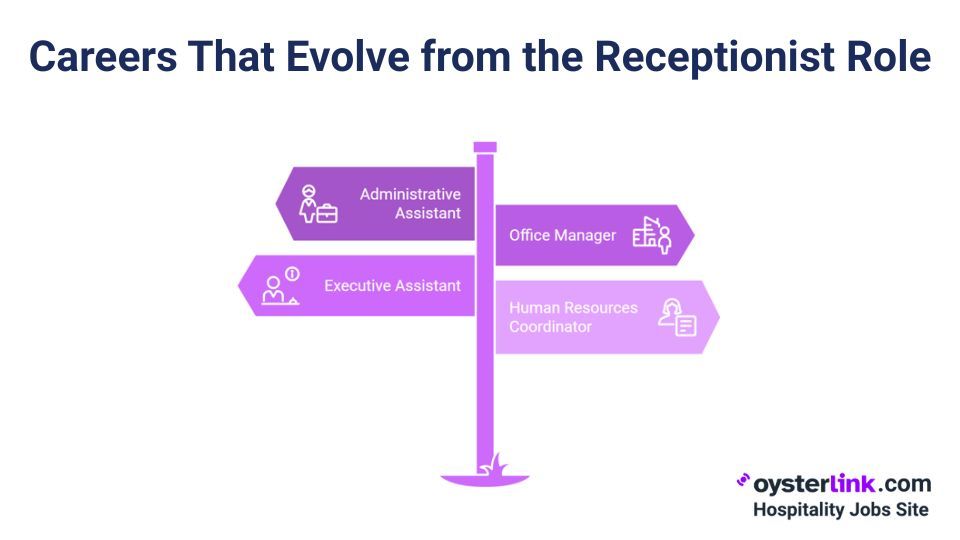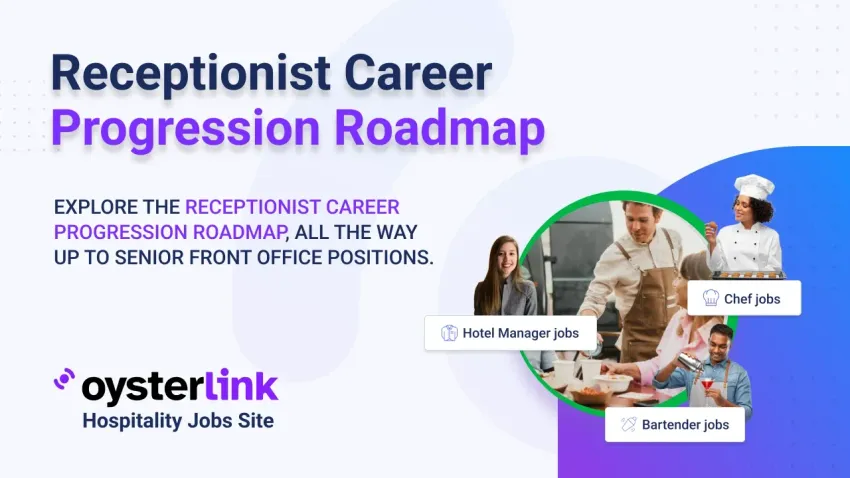Receptionist Career Progression Roadmap: Key Takeaways
- Receptionist roles provide a clear career path from entry-level to senior front office positions over 9+ years.
- Skill development in communication, administration, leadership and project management is essential at each stage.
- Receptionists can transition into diverse administrative careers like executive assistant, HR coordinator or office manager.
Understanding the Receptionist career progression roadmap helps individuals plan growth from entry-level to senior positions effectively.
This guide outlines key milestones, skill-building areas and potential career transitions for receptionists.
For hospitality employers looking to hire effectively, how to hire a Receptionist is a crucial resource to ensure you get the right candidate for this pivotal role.
1. Entry-Level Receptionist (0–2 years)
At the entry point, Receptionists handle front desk duties such as greeting visitors, managing calls, scheduling appointments and maintaining a professional environment.
The focus is on mastering phone etiquette, visitor management systems and basic administrative software while understanding office procedures.
This phase is critical for developing a polished professional demeanor and foundational administrative skills, setting the stage for career advancement.
For new Receptionists preparing for job interviews, reviewing common receptionist interview questions can boost confidence and performance.
2. Senior Receptionist (2–4 years)
With two to four years of experience, receptionists take on more complex tasks, including handling intricate inquiries and supporting multiple departments.
Senior Receptionists often assist with onboarding new staff and vendor relations, enhancing problem-solving and time management skills.
In this stage, individuals begin leading small projects and developing training skills, preparing for supervisory roles ahead.
3. Lead Receptionist (4-6 years)
Lead Receptionists oversee daily front desk operations, supervise junior staff, manage schedules and ensure quality service delivery.
This role demands leadership, delegation and conflict resolution abilities, along with mentoring responsibilities.
Lead Receptionists also contribute to process improvements and protocol development, playing a pivotal role in front office management.
Employers seeking to improve their hiring processes might find valuable insights in restaurant staff hiring strategies that can be adapted for front office teams.
4. Front Office Coordinator (6–9 years)
At this level, professionals manage the overall functionality of the front office area, including supervising administrative staff and vendor relationships.
They coordinate office events, oversee maintenance and optimize resources, requiring skills in budgeting, contract negotiation and project management.
This role bridges operational management with strategic office support, preparing individuals for senior leadership.
5. Front Desk Manager (9+ years)
As a Front Desk Manager, professionals lead the entire front office team, managing all administrative functions and ensuring operational efficiency.
The role involves setting office policies, overseeing budgets, managing staff performance and maintaining high service standards.
Advanced leadership, strategic planning, financial oversight and relationship building with senior leadership and external partners are essential skills here.
For hospitality businesses, understanding how to hire a Hotel Manager can provide further perspective on enhancing leadership hiring, complementing front desk management.
6. Transitioning to Other Administrative Roles
The competencies gained throughout a Receptionist career, including communication and organization, unlock pathways to various administrative positions.
Administrative Assistant
This role involves managing office supplies, coordinating meetings and supporting project management efforts, building on receptionist skills.
Office Manager
Office Managers oversee daily operations, manage staff and ensure that administrative processes run efficiently.
Executive Assistant
Executive Assistants support high-level executives by managing schedules and handling confidential information with discretion.
Human Resources Coordinator
This position involves recruiting, onboarding and employee relations, presenting another path leveraging receptionist experience.
Exploring career paths such as an Executive assistant or Human Resources Coordinator can be a natural progression for those with receptionist backgrounds.

7. Professional Development and Networking
To maximize advancement, receptionists should pursue ongoing education, build networks, find mentors and set clear career goals.
Continuing education
Certification programs like Certified Administrative Professional (CAP), workshops on communication and courses on office technology keep skills current.
Networking opportunities
Joining associations such as the International Association of Administrative Professionals (IAAP), attending industry events and leveraging LinkedIn foster professional connections.
Mentorship
Mentors provide guidance and insight, aiding in career transitions and personal growth within administrative fields.
Receptionists interested in professional growth might benefit from reading about mentorship in hospitality careers for tailored advice.
Setting career goals
Regular skill assessments and goal setting help maintain focus and motivation toward achieving desired career milestones.
8. Relevant Resources for Receptionist Career Development
- International Association of Administrative Professionals (IAAP)
- Certified Administrative Professional (CAP) Certification
- LinkedIn Learning
Receptionists seeking detailed insight into their career progression can also explore the comprehensive how to become a Receptionist guide for additional information.
Receptionist Career Progression Roadmap: Conclusion
Starting as an entry-level receptionist offers a strong foundation and clear growth trajectory toward senior front office management roles.
With strategic skill building, professional development and networking, Receptionists can advance within their field or transition to related administrative careers successfully.
By following this roadmap, individuals can navigate their career paths with purpose, enhancing both job satisfaction and professional opportunity.
Employers aiming to attract top talent for their front desk roles will find helpful strategies in Employer Branding in Job Postings article.










Loading comments...